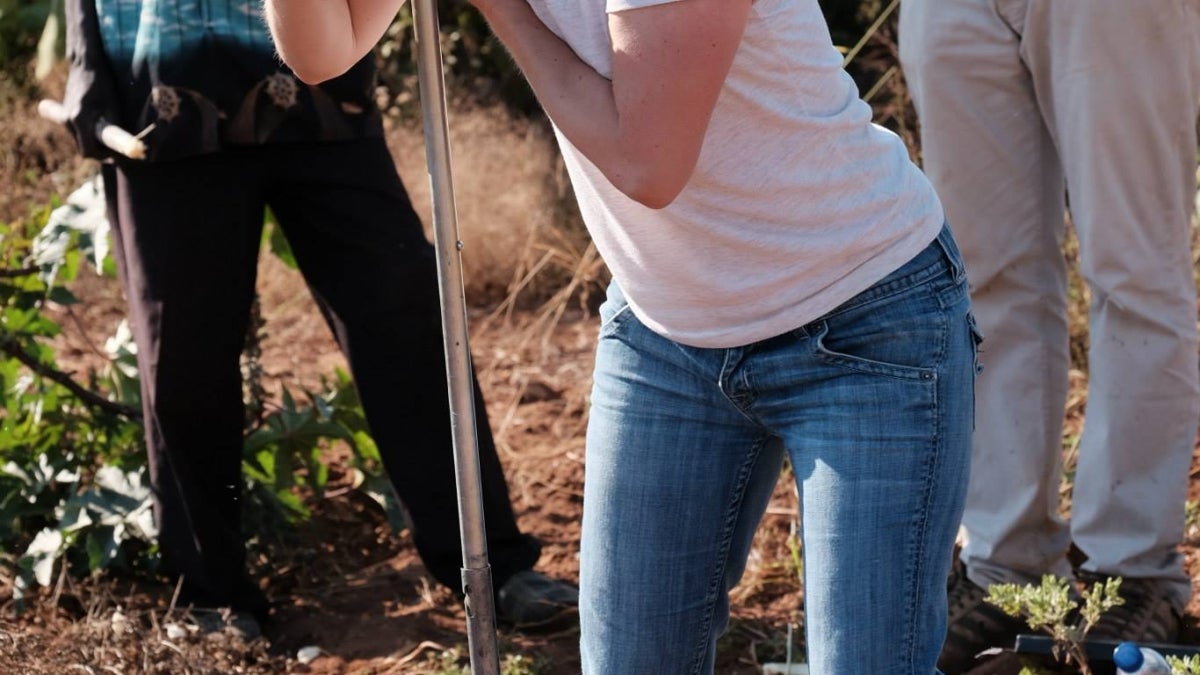New ASU professor studies climate change and migration

Valerie Mueller collecting a soil sample in Mozambique.
Valerie Mueller, a new assistant professor in the School of Politics and Global Studies, is settling right in to Arizona State University after joining the faculty in fall 2017.
Before coming to ASU, Mueller served as a research fellow at the International Food Policy Research Institute (IFRPI). She received her bachelor’s degree in environmental economics and policy at Berkeley before completing her master’s degree and doctorate at the University of Maryland. With a background in agricultural and resource economics, Mueller focuses on economic development, urban and environmental economics, immigration and migration, and economic adaptation and climate change.
Mueller talked to ASU Now about her research goals and what she hopes to accomplish while at ASU.
Question: What was some of the research you did at IFPRI? What was your experience there like?
Answer: At IFPRI, I worked on two major research areas. First, I worked on the drivers and consequences of internal migration in developing countries. This was particularly important because, in many of the African countries that I worked, land availability was scarce particularly for youth. Examining the viability of working outside of agriculture through migrating to secondary towns or cities is important to understand the employment prospects, if any, of future generations. Second, I was involved in field experiments to test how to improve the delivery of rural services in Africa, especially to women. In many of these countries, women farm as much as men, but they don't have access to the same information regarding novel agricultural practices, nor do they have the same access to secure land for farming. The latter means women often face the fear of having their land expropriated from them when their husband dies or when they are separated or divorced. We tried to see how current governments could design policies to reduce these barriers for women to farming in an experimental framework.
At IFPRI, I cherished working on policy-relevant research. By traveling frequently, I could see with my own eyes how people were living and the problems they faced. I also had the opportunity to work with local governments toward developing solutions to those problems. These experiences provided me with insights about development that I would never be able to have from reading articles at my desk. I am still affiliated with IFPRI to this day because I value the insights from colleagues being based in the country and I value having frequent interaction with local policymakers and stakeholders.
Q: What is your current research focused on?
A: Given my expertise in migration, I have recently started a large project on sea level rise and migration. We focus on countries vulnerable to future inundation in 2100. I am part of a large team of scientists and social scientists scattered around the U.S., Canada, and the UK. We will use the latest predictions of sea level rise and sea level extremes to predict where people from the U.S., Japan and other Asian countries will relocate and under what conditions we might observe these patterns. I was drawn to the topic because I have published several studies on migration related to heat stress. Sea level rise will likely affect location choices in a completely different way, since typical destinations for migrants within some countries will no longer be inhabitable and financing for international migration will be affected. It is not clear, without the coordinated efforts of the international community, whether these environmental migrants will be able to resettle on their own, without severe consequences for their own welfare and the welfare of others. It is an interesting puzzle to solve.
Q: Why did you decide to come to ASU?
A: Arizona State University offers some of the leading expertise on sustainable development. The university fosters and encourages policy-relevant, interdisciplinary research, which was right up my alley. I also craved working with students and passing on my knowledge and skills to the next generation. I hoped to inspire a few students to take an interest in solving similar global problems.
Q: What do you hope to accomplish as you work at the university?
A: I hope to pique the interests of undergraduate students to pursue careers in international development. If I could attract a few undergraduates and graduate students to work on similar research areas, I would also be thrilled. Overall, I will continue to work on research related to environmental migration and join existing and new initiatives in developing countries at ASU.
More Law, journalism and politics

Arizona secretary of state encourages students to vote
Arizona Secretary of State Adrian Fontes looked right and left, taking in the more than 100 students who gathered to hear him…

Peace advocate Bernice A. King to speak at ASU in October
Bernice A. King is committed to creating a more peaceful, just and humane world through nonviolent social change.“We cannot…

CNN’s Wolf Blitzer to receive 41st Walter Cronkite Award for Excellence in Journalism
Wolf Blitzer, the longtime CNN journalist and anchor of “The Situation Room With Wolf Blitzer,” will accept the 41st Walter…